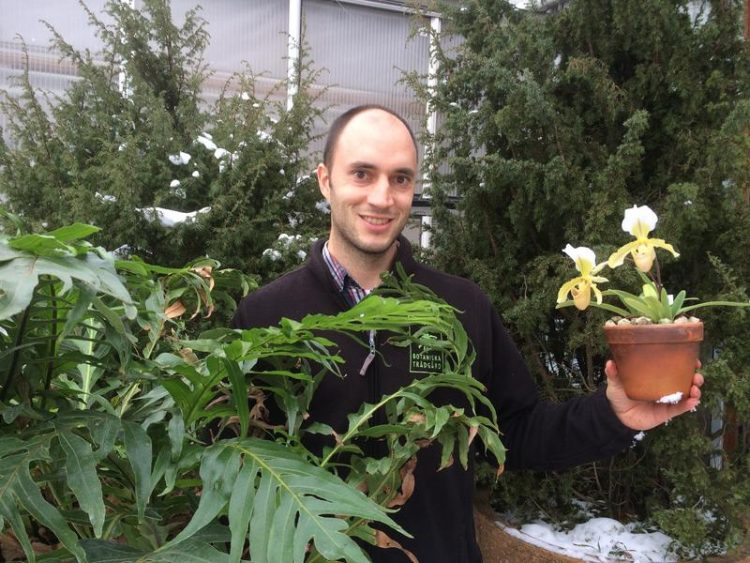Plants survive better through mass extinctions than animals

Dr. Alexandre Antonelli, University of Gothenburg University of Gothenburg
For over 400 million years, plants have played an essential role in almost all terrestrial environments and covered most of the world’s surface. During this long history, many smaller and a few major periods of extinction severely affected Earth’s ecosystems and its biodiversity.
In the upcoming issue of the journal New Phytologist, the team reports their results based on more than 20,000 plant fossils with the aim to understand the effects of such dramatic events on plant diversity. Their findings show that mass extinction events had very different impacts among plant groups.
Negative rates of diversification in plants (meaning that more species died out than new species were formed) were never sustained through long time periods. This indicates that, in general, plants have been particularly good at surviving and recovering through tough periods.
“In the plant kingdom, mass extinction events can be seen as opportunities for turnover leading to renewed biodiversity,” says leading author Daniele Silvestro.
Most striking were the results for the Cretaceous-Paleogene mass extinction, caused by the impact of an asteroid off the Mexican coast some 66 million years ago. This event had a great impact on the configuration of terrestrial habitats and led to the extinction of all dinosaurs except birds, but surprisingly it had only limited effects on plant diversity.
Some important plant groups, such as the gymnosperms (including pines, spruce and firs) lost a great deal of their diversity through extinction. On the other hand, flowering plants (angiosperms) did not suffer from increased extinction, and shortly after the impact they underwent a new rapid increase in their diversity. These evolutionary dynamics contributed to make flowering plants dominate today’s global diversity above all other plant groups.
“Mass extinctions are often thought as a bad thing, but they have been crucial in changing the world into how we know it today,” says senior author Alexandre Antonelli.
If that asteroid had not struck the Earth, chances are that large dinosaurs would still be hunting around, mammals would be small and hiding in caves, and humans might never have evolved.
“By studying such extreme events we are trying to learn which groups of organisms and features are more sensitive to changes, so that we can apply this knowledge to protect biodiversity in the face of on-going climate change and human deterioration of natural ecosystems,” concludes Antonelli.
Details on the publication:
Silvestro D, Cascales-Miñana B, Bacon CD, Antonelli A: Revisiting the origin and diversification of vascular plants through a comprehensive Bayesian analysis of the fossil record. New Phytologist (2015).
The full article is available free of charge at the following link: http://onlinelibrary.wiley.com/doi/10.1111/nph.13247/abstract
Note to Press. For more information you can contact:
Dr. Daniele Silvestro, phone +41 764 909931, e-mail: daniele.silvestro@unil.ch.
University of Gothenburg, Sweden & University of Lausanne, Switzerland.
Dr. Alexandre Antonelli, phone +46 703 989570, e-mail: alexandre.antonelli@bioenv.gu.se. University of Gothenburg, Sweden
http://science.gu.se/english/News/News_detail//plants-survive-better-through-mas…
Media Contact
All latest news from the category: Life Sciences and Chemistry
Articles and reports from the Life Sciences and chemistry area deal with applied and basic research into modern biology, chemistry and human medicine.
Valuable information can be found on a range of life sciences fields including bacteriology, biochemistry, bionics, bioinformatics, biophysics, biotechnology, genetics, geobotany, human biology, marine biology, microbiology, molecular biology, cellular biology, zoology, bioinorganic chemistry, microchemistry and environmental chemistry.
Newest articles

Properties of new materials for microchips
… can now be measured well. Reseachers of Delft University of Technology demonstrated measuring performance properties of ultrathin silicon membranes. Making ever smaller and more powerful chips requires new ultrathin…

Floating solar’s potential
… to support sustainable development by addressing climate, water, and energy goals holistically. A new study published this week in Nature Energy raises the potential for floating solar photovoltaics (FPV)…

Skyrmions move at record speeds
… a step towards the computing of the future. An international research team led by scientists from the CNRS1 has discovered that the magnetic nanobubbles2 known as skyrmions can be…





















